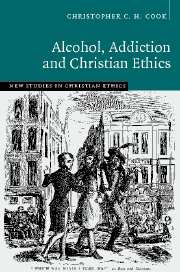Book contents
- Frontmatter
- Contents
- General editor's preface
- Preface
- 1 Alcohol, addiction and Christian ethics: introduction
- 2 An addiction in context: the use, misuse and harmful use of alcohol
- 3 Drunkenness as vice in the New Testament
- 4 Drunkenness as intemperance: Augustine, Aquinas, Luther and Whitefield
- 5 Temperance redefined: the nineteenth-century temperance movement
- 6 Addiction as sin and syndrome: the divided self
- 7 Alcohol, addiction and Christian ethics
- 8 Conclusions
- Bibliography
- Index of Bible references
- Index of names and subjects
8 - Conclusions
Published online by Cambridge University Press: 22 September 2009
- Frontmatter
- Contents
- General editor's preface
- Preface
- 1 Alcohol, addiction and Christian ethics: introduction
- 2 An addiction in context: the use, misuse and harmful use of alcohol
- 3 Drunkenness as vice in the New Testament
- 4 Drunkenness as intemperance: Augustine, Aquinas, Luther and Whitefield
- 5 Temperance redefined: the nineteenth-century temperance movement
- 6 Addiction as sin and syndrome: the divided self
- 7 Alcohol, addiction and Christian ethics
- 8 Conclusions
- Bibliography
- Index of Bible references
- Index of names and subjects
Summary
It has been proposed here that the Christian concepts of sin and grace provide a theological framework within which alcohol, drunkenness and addiction might be understood without reverting to what is popularly thought of as being the outmoded ‘moral model’. The latter model singled out the drunkard as being sinful because morally weak. But Christian theology has never, properly, singled out drunkenness in such a fashion. Rather, it has understood drunkenness as being only one kind of moral failing, and humanity as universally afflicted by a sinful nature, albeit also enjoying a nature which reflects the image of its divine creator. This, divided, human condition is thus prone both to a desire for the grace which is offered by its creator, who is ultimately good, and also a desire for created objects for their own sake, and for selfish ends, which, thus idolised, become evil. These desires are experienced in different ways by different people, according to the unique biological and psychological makeup of each individual, and the varying physical and social environments in which people find themselves.
Alcohol is but one desirable commodity that human beings may encounter in this context. However, its biological, social and psychological ambiguities perhaps especially predispose it to becoming a very visible and challenging example of the ways in which human beings may become divided within themselves between a desire for that which they recognise as good and a desire for that which is recognised as bad.
- Type
- Chapter
- Information
- Alcohol, Addiction and Christian Ethics , pp. 197 - 201Publisher: Cambridge University PressPrint publication year: 2006

